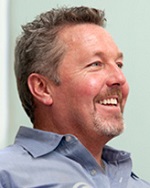Over the years the partners at Third Rock have whipped up a wave of biotech startups focused on new cancer drugs, gene therapies, heart disease, gene editing and much, much more. Now they're tackling new therapeutics for hearing loss, convinced that this is a prime time to create a new company from the ground up in a field that's been long neglected by drug developers.
 |
| Kevin Starr |
In classic Third Rock fashion, the partners have gathered together a brain trust of leading researchers in the field, put co-founder Kevin Starr at the helm as interim CEO of Boson-based Decibel Therapeutics, and will set sail with a staff of 9 and plans to bring dozens more on board in the next two years. To get through the next three years, at least, Third Rock and SR One (GSK's venture arm) are putting up $52 million in Series A startup cash.
That money will be put to use building a pipeline of drugs that can be used to repair, restore or protect hearing, with a list of science founders that includes Charles Liberman at Harvard Medical School, Gabriel Corfas at the University of Michigan, Scripps' Ulrich Müller, and Albert Edge from Massachusetts Eye and Ear.
Liberman has been publishing work on using neurotrophins to restore synapses and repair hearing damaged by noise, and Starr notes that that is the work that is closest to the clinic at Decibel.
"Liberman has been a giant among men in the hearing space," says Starr, who's also quick to highlight the accomplishments of the rest of the brain trust. All of them have been discussing the science and mapping this startup for roughly two and a half years.
"This is the first time we've done hearing, or anyone has done hearing on this scale," adds Starr, who believes the hearing field is in a place where vision and eye drugs were 10 to 15 years ago as the VEGFs and other new therapies began to take shape.
In recent months a whole lineup of Third Rock companies have gone public as the IPO market remained sizzling hot. A considerable amount of the sizzle, though, has fizzled in recent weeks as valuations plunged in the wake of Hillary Clinton's famous tweet on drug price controls. But Starr says Third Rock is well situated with its third fund to continue ramping up companies, which can bank on a solid set of fundamental advantages.
A lot of generalist investors got into biotech investing through ETFs, says Starr. Any kind of volatility can easily flush the generalists right back out of the industry. But a lot of specialist investors like Deerfield are still eager to wager more on biotech, and that should ensure that real innovation in this business can continue to get funding, even in a downturn on the IPO end.
Whatever happens to the IPO cycle, he adds, no one ever shut off Big Pharma's demand for new pipeline products. And Decibel can hear the market calling for what they're working on.
"Many, many companies recognize (hearing) is a new frontier," says Starr, who's spent a good part of the past 8 years assessing markets and catering to large players. Companies with major R&D efforts who have no intention of doing this kind of early-stage work on hearing internally may find themselves competing for the kind of pipeline programs Decibel is sounding out.
- here's the release